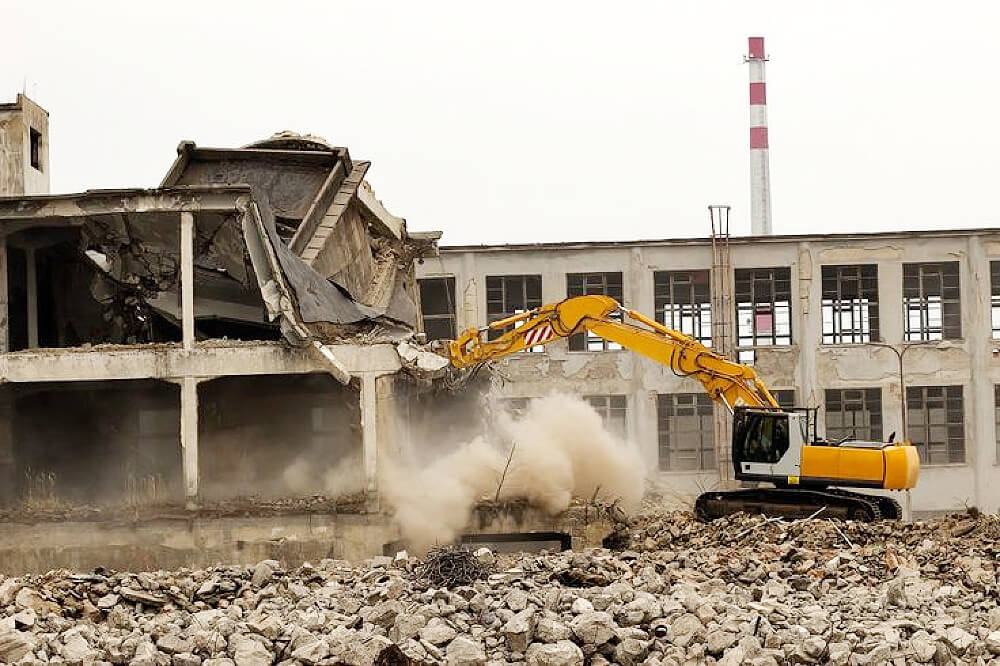
Ensuring Safety in Industrial Demolition Services
Safety needs to be the first consideration whenever industrial demolition services are provided. Due diligence is necessary to protect workers and the environment from any risks and hazards associated with these projects. This article explores several precautions and best practices that businesses may use to ensure worker safety while doing industrial demolitions.
OUR SERVICES
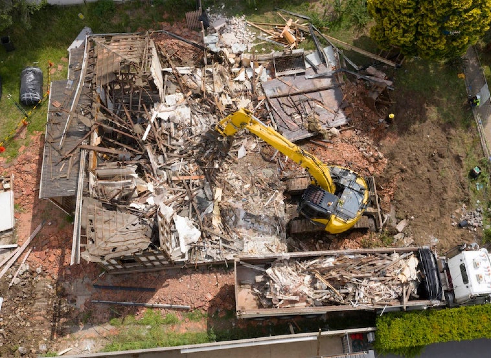
Structure Demolition. Residential, Commercial & Industrial
If your structure poses a health, safety, or environmental risk, demolition can prevent costly citations or fatal accidents. While this may seem daunting, you are just a phone call away from having your residential demolition done professionally, responsibly, and at a great price.
Talk to a Demolition Specialist Now! 916.249.5001
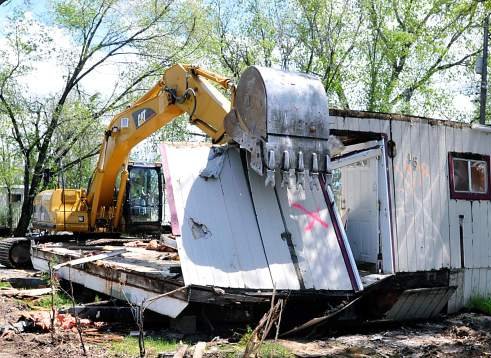
Mobile Home Demolition
We demolish and haul away mobile homes. Any size, anywhere, anyhow. We are fast, clean and competitive. We serve most of Northern California. There are many factors to consider when removing or demolishing your old trailer, mobile home, or manufactured home like: the processes involved, costs, time, contractors, debris, and permits.
Talk to a Demolition Specialist Now! 916.249.5001
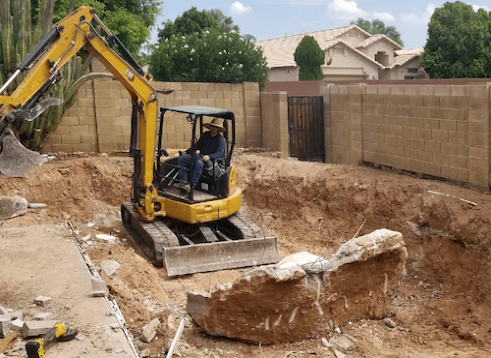
Pool Demolition
When removing a pool in Sacramento, California with the professional demolition team of Maxton Demo, you’re guaranteed peace of mind from beginning to end. From your initial request for an estimate to clean-up, you can expect our pool demolition process that’s completely professional and safe.
Talk to a Demolition Specialist Now! 916.249.5001
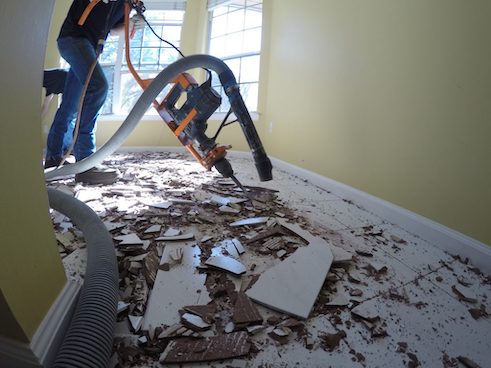
Floor Demolition
Flooring demolition, like any other major home renovation work, requires a specific set of skills and tools to be performed properly. You need experts in flooring demolition to get you the best floors possible. Contact us to find out more about how we can help you today.
Talk to a Demolition Specialist Now! 916.249.5001
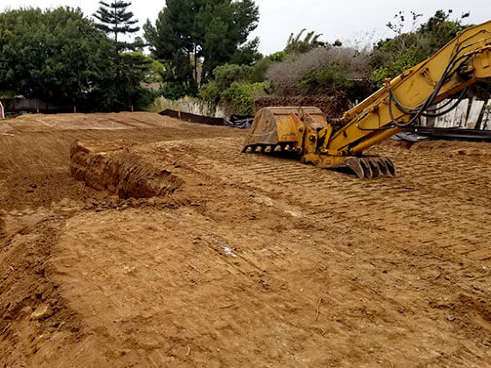
Grading & Excavating
If you need an experienced excavator and grader in Sacramento, call us today. One of the many reasons that residential, commercial, and industrial customers choose to work with us is because we’re able to provide a broad range of services to help construction-related projects get done in less time and at a reduced cost.
Talk to a Demolition Specialist Now! 916.249.5001

Roof Snow Removal
Heavy snow & ice dams can cause significant roof and home damage. Roof Snow removal is our specialty during the winter months. Serving the Sacramento, California area for 10 years, we can get your roof snow removed and promise a quick response and reasonable rates.
Talk to a Demolition Specialist Now! 916.249.5001
The Value of Safety in Services for Industrial Demolition
Industrial demolition projects have intricate duties that need to be carefully planned and carried out. These tasks, which could include anything from demolishing buildings to getting rid of dangerous chemicals, can be very dangerous for the environment and the workforce if safety precautions are not taken. For this reason, it is essential that businesses put safety first throughout the whole demolition process.
Businesses that maintain safety for their employees also lessen the risk of legal trouble. Accidents or injuries may result in expensive litigation, delays in projects, and reputational harm to a business. However, a dedication to safety may improve a business’s standing and draw in additional customers who respect a safe workplace. Making safety a top priority also shows a company’s dedication to sustainability and ethical business practices, two things that are becoming more and more significant to both customers and companies.
Common industrial demolition risks and hazards
Projects involving industrial demolition have a number of dangers and hazards that need to be properly controlled. Structural instability, exposure to dangerous chemicals, falls from heights, and possible fires or explosions are a few prevalent concerns. Before starting any demolition activity, businesses must identify and manage these threats via comprehensive risk assessments.
An important concern associated with industrial demolitions is structural instability. Structures that are no longer in use may have become structurally unstable due to deterioration over time. This instability puts workers and the surrounding surroundings at risk of collapses or unanticipated structural breakdowns. It is essential to conduct appropriate assessments and apply reinforcing measures to guarantee the stability of the building while it is being demolished.
Hazardous elements like asbestos, lead, or mold might be present in the structures that are about to be demolished, which poses an additional danger. When demolished, these materials may leak into the air or water and cause damage. Hazardous material identification, removal, and disposal require adherence to stringent processes by businesses in order to safeguard employees and avoid contaminating the environment.
Guidelines and Safety Rules for Industrial Demolition
Businesses must follow all applicable rules and regulations in order to guarantee safety during industrial demolition operations. Comprehensive rules for demolition techniques are provided by regulatory authorities, such as the Occupational Safety and Health Administration (OSHA) in the United States. These rules address things like using equipment properly, managing dangerous products, and protecting workers.
Companies should also adhere to industry standards and best practices established by organizations such as the National Demolition Association (NDA). These instructions provide insightful information about the most recent industrial demolition safety procedures and methods. Businesses may make sure they are putting the best safety precautions in place by adhering to industry standards.
Certification and Training for Workers in Demolition
A key component of guaranteeing safety in industrial demolition services is funding worker training and certification initiatives. For demolition professionals to do their jobs safely, they must possess the requisite knowledge and abilities. Appropriate training increases efficiency and output while lowering the chance of accidents.
Numerous subjects should be covered in training programs, such as safe tool and equipment handling, hazard detection and mitigation, emergency response protocols, and the use of personal protective equipment (PPE). OSHA’s 30-hour Construction Industry Outreach Training Program is one example of a certification program that offers thorough training in compliance with industry requirements.
Companies must constantly update and revamp their training initiatives in order to provide employees with the most recent information on safety procedures and technological advancements. Businesses may guarantee a high degree of safety competence among their workers by making investments in their workforce development.
Demolition workers’ personal protective equipment (PPE)
To protect demolition workers from possible risks, personal protective equipment (PPE) is essential. PPE consists of things like protective clothes, gloves, safety glasses, helmets, and respiratory protection. Employers are required to provide workers with the right PPE and to oversee its use.
The particular risks that exist at the demolition site should be taken into consideration while choosing PPE. For instance, respiratory protection has to be provided if there is a chance of being exposed to asbestos or other airborne toxins. PPE must be routinely inspected, maintained, and replaced as needed to guarantee its efficacy and to replace any worn-out or broken gear.
PPE should be used correctly, and workers should be taught the significance of wearing it at all times while doing demolition tasks. PPE use should be enforced, and supervisors should do routine compliance inspections. Prioritizing PPE usage helps firms dramatically lower the risk of diseases and injuries among their employees.
Guidelines and Safety Procedures for Industrial Demolition Projects
During industrial demolitions, it is crucial to implement thorough safety measures and standards in order to provide a secure working environment. All facets of the demolition process, from site preparation to the last cleaning, should be covered by these protocols. Effective communication and rigorous adherence to safety procedures are essential for a demolition project’s successful completion.
A comprehensive site evaluation should be carried out before beginning any demolition work in order to identify possible dangers and create mitigation plans for them. This evaluation includes determining the building’s structural stability, locating potentially dangerous materials, and estimating the hazards related to any buildings or utilities nearby.
Additionally, businesses have to create a thorough safety plan that specifies the precise safety precautions that will be used during the demolition job. Procedures for handling hazardous products, operating equipment safely, responding to emergencies, and conducting routine safety inspections should all be part of this strategy. To make sure that all employees are informed of safety procedures and their responsibilities for maintaining a safe workplace, regular safety meetings must be conducted.
Setting Up and Evaluating the Site for Safe Demolition
In order to ensure worker safety during industrial demolitions, the site must be properly prepared. The site should be carefully inspected to detect any possible dangers and hazards before any demolition activity is started. This evaluation aids in choosing the proper tools, techniques, and safety precautions to be used during demolition.
The stability of the building or structure that is to be destroyed should be evaluated by structural engineers and demolition specialists. The foundation, load-bearing walls, and other structural elements are all inspected as part of this assessment. Reinforcement measures should be put in place if any vulnerabilities or safety issues are found in order to guarantee the stability of the building during destruction.
Additionally, clearing out any dangerous items from the structure should be part of site preparation. Strict processes must be followed in order to securely remove and dispose of asbestos, lead, and other toxins. Improper handling of these materials may lead to serious health hazards and environmental harm.
Plans for Emergency Response and Backup Strategies at Demolition Sites
Industrial demolitions may nevertheless result in unanticipated crises, even with careful planning and preparedness. In order to handle any catastrophes quickly, businesses need to have clear emergency response and contingency plans in place.
Procedures for evacuating employees, notifying emergency services, and handling particular situations, such as fires, building collapses, or chemical spills, should all be included in a thorough emergency response plan. It is essential that employees understand the emergency plan and get frequent training on emergency response procedures.
In order to guarantee efficient collaboration in times of crisis, businesses should also set up channels of communication and procedures. This entails keeping in touch with the essential stakeholders, the local government, and any surrounding citizens or companies. Companies may reduce the effects of unanticipated events and safeguard the safety of their employees and the community by having a well-prepared emergency response plan.
In order to minimize possible liabilities and safeguard both the environment and the workforce, industrial demolition services must prioritize safety. Through the implementation of appropriate safety practices and adherence to industry standards, businesses may provide a safe working environment that fosters customer trust.
Industrial demolitions need the implementation of many crucial measures, including extensive safety plans, training and certification programs, thorough site evaluations, and the use of personal protective equipment.
Businesses that invest in safety not only protect their employees but also build their brand and draw in new business. Placing safety first shows a dedication to moral behavior, sustainability, and high-quality service delivery. Industrial demolition services may confidently embark on projects knowing that the environment and the well-being of their staff are safeguarded when the proper safety precautions are in place.
Overseeing Licenses and Rules for Industrial Demolition Services
Structures and facilities must be disassembled, deconstructed, or removed as part of industrial demolition initiatives. Careful planning and execution are necessary for these projects to guarantee worker safety, preserve the environment, and adhere to local, state, and federal standards.
Since they give the project the legal go-ahead to proceed, permits are essential to the demolition process. You might be subject to fines, penalties, and even legal action if you don’t have the required permissions. Furthermore, adherence to safety protocols and ecological considerations is vital to safeguarding laborers, adjacent communities, and the environment.
An Overview of the Various Permit Types Necessary
Industrial demolition licenses may be difficult to come by and take a long time to obtain. The precise permissions needed may vary depending on a number of variables, such as the project’s size, location, and type. The following are some typical licenses that you could need to obtain:
Demolition Permit: This document, which authorizes the demolition of a building, is normally granted by the neighborhood building department. It guarantees that the demolition is done safely and in accordance with the laws in the area.
Environmental licenses: These licenses are required for the removal of asbestos, the abatement of lead paint, and the disposal of hazardous materials, among other possible environmental risks connected to industrial deconstruction. They see to it that the right procedures are followed in order to stop pollution and safeguard public health.
Permits for the Control of Noise and Dust: Industrial demolition operations may produce excessive amounts of dust and noise, upsetting the neighbors’ homes and businesses. Getting licenses for dust and noise control reduces these problems and guarantees adherence to regional noise laws.
debris disposal permits: In order to save the environment and avoid pollution, demolition debris must be disposed of properly. Permits for the disposal of garbage guarantee that it is handled, transported, and disposed of in compliance with relevant laws.
Recognizing the Industrial Demolition Regulation Framework
It is essential that you get acquainted with the regulatory framework regulating industrial demolition projects before starting one. Local, state, and federal regulations might differ, so knowing the particular requirements can make it easier for you to manage the permission procedure.
Local laws often specify the particular permits needed, the building rules to be adhered to, and any further restrictions relevant to the project’s location. Certain rules and environmental issues may also be mandated by state laws. Federal laws, such as those imposed by the Environmental Protection Agency (EPA), provide guidelines for handling dangerous items and handle more general environmental issues.
How to Get the Licenses You Need for Industrial Demolition
Planning and cooperation are essential to obtaining the required permissions for industrial demolition. The general phases in the permission procedure are as follows:
Research and documentation: To start, find out which particular permits are needed for your project and collect the essential paperwork, such as safety procedures, project plans, and environmental impact assessments.
Pre-Application Meeting: Arrange a pre-application meeting to go over the details of your project, clarify any questions or concerns, and talk about the requirements with the local building department.
Submission of Permit Application: Complete the application and send it in with the necessary supporting paperwork. Verify that all of the material is true, comprehensive, and compliant with the rules.
Evaluation and Approval: The project’s regulatory compliance will be evaluated by the authorities as part of the permit application assessment procedure. Coordination with other departments or agencies, environmental evaluations, and inspections may all be part of this.
Issuance of permissions: Should your application be accepted, you will get the necessary permissions, allowing you to start the demolition process. It’s crucial to thoroughly read the permits and abide by any guidelines or requirements stated.
Adherence to Ecological Guidelines During Industrial Demolition
If industrial demolition projects are not done correctly, they may have a major negative influence on the environment. Adherence to environmental standards is crucial in mitigating these damages and safeguarding the adjacent ecology. Here are some crucial things to remember:
Asbestos and Hazardous Materials: It is crucial to locate and remove any asbestos-containing materials (ACMs) and other hazardous materials properly before destruction. Hiring qualified experts and adhering to set procedures are necessary in order to avoid exposure and contamination.
Air and Water Quality: The quality of the air and water might be endangered by dust and water runoff produced during demolition. Implementing strategies like waste management plans, sediment control barriers, and dust suppression systems may help reduce these hazards and guarantee that environmental laws are followed.
Protection of Wildlife: Projects involving industrial demolition may invade the habitats of animals that are legally protected. To reduce disturbance and adhere to rules, it is crucial to carry out comprehensive assessments and, if required, get licenses for the transfer of species or the restoration of habitat.
Typical Difficulties in Keeping Regulations and Permits
Because industrial demolition is such a complicated operation, managing permits and regulations may be difficult. The following are typical difficulties you could run into:
Changing Regulations: Industrial demolition regulations are subject to change, so it’s important to keep up with the most recent standards. Navigating these developments successfully may be aided by seeking expert advice and often monitoring regulatory updates.
Interagency Coordination: Building departments, environmental agencies, waste management authorities, and other organizations are often involved in industrial demolition operations. The permission process may be streamlined by ensuring that various entities collaborate and communicate effectively with one another.
Time and Money Restraints: Getting permissions and following rules may require large time and money commitments. Planning ahead, interacting with authorities early on, and getting expert aid may all save delays and overspending.
The Advantages of Using Skilled Industrial Demolition Services
Hiring professional demolition services may have a number of advantages given the difficulties and dangers involved in adhering to rules and permissions for industrial demolition.
Knowledge and Experience: Qualified demolition services have the know-how and experience needed to successfully manage complicated demolition projects in a safe and effective manner, negotiate the permit process, and adhere to regulations.
Time and Money Savings: You may save a lot of time and money by hiring experts to handle the demolition operation. You may concentrate on other areas of your project while they take care of the permit applications, monitor compliance, and carry out the demolition quickly and effectively.
Risk Mitigation: Safety, environmental preservation, and regulatory compliance are the top priorities for professional demolition services. Their attention to safety procedures and industry best practices reduces the possibility of mishaps, legal problems, and project delays.
In summary
An essential component of guaranteeing a successful and legal project in industrial demolition services is handling permits and laws. This guide has given you the knowledge and resources to confidently navigate the complexities of industrial demolition, from appreciating the significance of permits and regulations to securing the required permits, adhering to safety and environmental regulations, and overcoming typical obstacles.
Recall that the secret to a successful demolition project is careful planning, good coordination with local authorities, and attention to safety and environmental regulations. To take advantage of their knowledge and guarantee a seamless and legal demolition procedure, think about using competent industrial demolition services.
You may now confidently start your next job since you have a thorough grasp of handling permissions and laws in industrial demolition services.
Do you have a Question?
Talk to a Demolition Specialist Now! 916.249.5001
Request Formal Quote